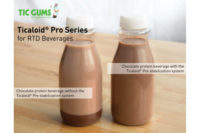
There are a number of technical concerns that confront dairies when working with soy in-gredients. For example, there is always the issue of taste.
Soy protein isolates and concentrates are exposed to many processing and refining steps. Therefore, they often exhibit a metallic or "chemical" aftertaste, which is very difficult to cover up. Historically this issue has been addressed with masking agents, sweeteners and flavors. All of these add cost and complicate the use of soy within a dairy plant.
Whole soybean powder is minimally processed, using only water. It does not develop the process flavor, which is difficult to hide. Instead it has a sweet grain like-flavor note.
Also, soymilk made from liquid concentrates or extracted from whole beans can very rap-idly develop off flavors due to the active enzymes naturally present in soy. These flavor-producing enzymes are deactivated within seconds of the beginning of the whole soybean powder process, and therefore the powder ensures a consistent, pleasant flavor in the finished soy bever-age product.
Another technical concern has traditionally been processing. In other words, how does a processor incorporate soy into dairy foods. Fortunately, whole soybean powder can easily be in-corporated into dairy products. No special mixing is required and the powder is virtually self-stabilizing, so extra hydrocolloids are not normally needed. A dairy can process the whole soy-bean powder just like any other powder ingredient (e.g., cocoa powder, sweeteners, flavors, etc.) that is currently being used in the plant.
Lastly, there is always that issue of introducing a known allergen into a food or beverage manufacturing plant. Indeed, the soy allergen issue has been a great concern for dairies. Proces-sors deal with this issue every day by using good sanitation procedures and good manufacturing practices.
In general, the less chance for mistakes in a plant, the better. One of the critical points in any dairy is their receiving bay. Because dairies do not have to use their liquid receiving bays when using this organic whole bean powder, the dairy can better control the process flow within their plants and ensure adequate sanitation procedures, which minimize any possible contamina-tion issues. Also, if there is any disruption in the processing plans for any given day, the plant personnel do not have to deal with an ingredient (liquid soy), which has a very limited shelflife in its bulk state.
Baby boomers are very concerned about staying healthy. They often look toward eating right as a way to avoid the rising cost of treating health issues with drugs and doctors. Dairy products that deliver all the health benefits of cows milk, as well as supply the additional specific boomer-related health benefits of soy (i.e., heart health, fiber and cancer prevention) are very at-tractive to this powerful demographic.
Organic whole bean powder is just one way, an easy way, for dairies to test the market with out having to invest any capital, while continuing to use their current assets, as well as their current existing sales and marketing channels.

